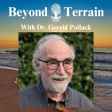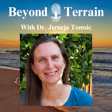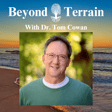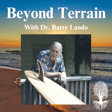Introduction to Jacob Diaz
00:00:02
Speaker
Welcome back everybody to another episode of the Beyond Terrain podcast. We're joined today by a special guest, Jacob Diaz, the undercover virologist. And I got to say that's probably the coolest name out there. Honestly, I love it. I love it. Undercover virologist. Super cool, man. Super cool.
Why Start a Health Podcast?
00:00:19
Speaker
Um, yeah, we're going to dig a little deeper into, you know, the train perspective of things here. We're going to hear his perspective. I know that, um, it can get a little technical on this. This might get a little technical, but, uh,
00:00:32
Speaker
That was one of the reasons why I wanted to start this podcast. I really wanted to dig deep. There was a lot of surface stuff in a lot of the podcast I listened to. I think we'll get into it and we'll see where it goes here. Jacob, thank you very much for coming on today. I really appreciate it. Thank you very much for the invitation. I'm excited, man. Yeah, great.
Redefining Health: Simplicity and Nature
00:00:55
Speaker
So I like to start the podcast off. I like to ask my guests, you know, to kind of define health and what health means to them. Cause I think that gives us a good baseline and, uh, you know, we can work out from there what health means to me. Um, health is.
00:01:11
Speaker
It's a complex that is honestly very simple. And when I've been learning regarding the terrain paradigm, I don't even call it the terrain theory anymore. I call it the terrain paradigm. It's not a theory. It's the way the body works. It is the way the body and nature coexist together. The body and nature are one. So health is as close as you can get to nature as possible and as simple as you can live while being happy.
00:01:40
Speaker
Um, the body seeks, as you know, homeostasis all the time. It doesn't like to be out of balance. It likes to heal and likes to just live a nice life. So if we can keep our bodies and our minds aligned with what it wants, along with having those natural principles in our life,
00:01:59
Speaker
Like with you, you eat primal, you eat the animal foods and all that. That's very good aligning with what the body actually wants. Nutrient dense, you're giving it what it wants and it's going to be healthy. If you don't give the body what it wants, it's going to be unhealthy.
00:02:13
Speaker
you don't give the body what it needs, it's going to be unhealthy. And the way you think as well. Are you mentally, spiritually, emotionally strong? Are you able to control your emotions? Are you able to conquer your trauma? And if you're not, that's going to affect your health as well. So it's a complex in terms of nutrition, in terms of
00:02:30
Speaker
emotions and your feelings and what you're exposed to in your environment. But health is so simple. Honestly, just remaining happy eating the good food and making your body move and just keeping your mind steady. It's just it's so when I'm when I'm answering these questions on VMs and my posts, I love getting technical, but
00:02:52
Speaker
people really over-complicate health.
Critique of Modern Medicine
00:02:55
Speaker
They do. And Harvey Bigelson, who I've been looking into his work, the Bigelson Brothers and his books, Doctors Are More Harmful Than Germs, and then the other one is Holographic Blood. He says that health is very simple, but people are complicated. We've grown up in this paradigm of allopathic medicine that tries to be very specific and technical with their nomenclature that kind of bores us to the point where we don't know anything about anything.
00:03:22
Speaker
So we just take these medicines. We just listen to the white coats. And then we end up in a life of sickness and eventual early death. So we try to overcomplicate these things, but it's really so easy. Listen to your body. It tells you what it wants. It tells you what it needs. You just have to learn how to listen. And you also have to learn the basics in terms of how to handle your emotions and eating right and helping your body move. Simple stuff. Yeah. Perfect answer. I love it. I couldn't agree more. Yeah.
00:03:51
Speaker
Yeah. And I think as humans,
Challenges of Living Naturally
00:03:53
Speaker
yeah, I like, like you said, like, I love that quote, eh? It's, it's, you know, we, we overcomplicate everything because really it's quite simple and it's, and you know, we've talked about it a little bit before and it's like, it's just getting back to nature. It's getting back to nature. It's really simple, but you know, it's, it's, um, but living in these modern environments, I will say we have overcomplicated life, you know, where even in the natural environment, you have microplastics everywhere, you know, even in the woods,
00:04:19
Speaker
anywhere in the woods near me, you still have electromagnetic frequencies from cell towers or whatever it is. So there is this kind of underlying contamination now, even when you are getting back to nature. So I think that, and, but it is, it's not, that's not nature's fault. It's our fault.
00:04:37
Speaker
I get you 100% because I see people, they'll be like, I understand going natural, but our world, it's so tough to live in. And I agree. We're surrounded. And as you said, currently, I live in a more secluded area, if you will. I grew up in New York City. So obviously, that's talked since 24-7. But where I live now, I mean, even then, you're still in the forest and you see a cell tower, or you still see the chem trolls when you wake up, or when you look up.
00:05:03
Speaker
our soil even isn't as mineral dense as it should be. So there are definitely reasons behind our health declining, even if we're in a natural world. But being more natural is always going to be better than just living in a toxic environment, 20%. 100%. Couldn't agree more. Yeah, that's it. So I guess we will start this conversation off.
Pleomorphism vs. Germ Theory
00:05:28
Speaker
We can take many different directions. I want to get your thoughts on player morphism.
00:05:33
Speaker
All right. I love pleomorphism, man. First of all, it's such a cool word. Second of all, it is the principle behind why germ theory is so fallacious.
00:05:47
Speaker
And we covered this in the end of COVID in our bacteria episode. And we did in my history of germ theory versus terrain theory, I believe, or Bichant versus pastoral episode, I covered this as well. And Dr. Mary Arce, I don't know if you're familiar with her work, but she actually studied pleomorphism directly.
00:06:08
Speaker
And her mother was an electron microscopist, so she knows how to see these things. So to give people a quick, non-boring background, because this stuff to me is not boring at all. It's really cool. But essentially, you had a lot of people throughout time. We know of Louis Pasteur and Robert Koch, these guys that had the backing of all of all the people with all the money. And they were the ones that were trying to prove that germs causes even though their experiments were fallacious.
00:06:37
Speaker
and their results were inconsistent at best. They were never adequately able to prove that germs were the cause of any sort of disease. So they pivoted towards viruses, which are unseen particles, and then made claims of all these things. Whereas guys like Antoine Besschamp, Gunther Enderlein, Gaston Neesons, there's another Claude Bernard, all of these people, and even currently you have Dr. Mary Arce, you have
00:07:07
Speaker
Dr. Berlando, Dr. Robert Young, all of them see something completely different. Now, what is it that they're seeing? Essentially, we're seeing that microbes of all kinds, we're talking bacteria,
00:07:21
Speaker
We're talking fungus, we're talking yeast. All of these are essentially the same being, the same essentially core microbe. We call it either the microzymma or the somatid or the protid. This is also seen with the Biggleson brothers work with the holographic blood. They also see the pleomorphism. So what does it mean? What does pleomorphism mean? It just means that these microbes, these microbes,
00:07:47
Speaker
are changing their shape, their size, their morphology, depending on the environment of the terrain. So wherever they are in the body, you can say the kidney, you can say the liver, you can say the lungs. And then depending on how healthy something is, the pH level, the toxic exposure, certain of microzymas or proteas or somatase, whatever you want to call them.
00:08:06
Speaker
will change the way they look to adapt to that environment. So when people, especially in the health space, they'll say, there's good and there's bad bacteria. No, there's no such thing as good and bad bacteria. There's only bacteria. They only do one thing. They do a lot of things, but their main thing is to eat dead and dying tissue.
00:08:26
Speaker
So if they're in a pleomorphic state like an E. coli or like an H. pleori or something that we would claim is pathogenic, we have to look at why it's in that state. Why is it that it had to change into a pneumonia, into a tuberculosis? Well, because if it didn't, it would die in that environment. So it's going to change the way it lives and what it eats to then begin to detoxify the body.
00:08:53
Speaker
So that completely puts a nail in the whole germ theory where they say one germ equals one disease. When we see in the work of Bichamp, especially in his book, Bichamp v. Pasteur, not his book, but it was a book written about that, where you see in his work, he was able to see these things coming from everything. Minerals, tissues, lively tissues had these protids there that were constantly changing.
00:09:21
Speaker
and coming out of blood cells, surrounding things, building themselves into bacteria. And then there's a cycle. So normally in a healthy body, they're not going to be doing anything. They're going to be dormant because it's healthy. There's nothing to detoxify. There's nothing to respond to.
00:09:36
Speaker
But the more and more sick you get, the more acidic you get, the different parts of the body that get sick, they're going to constantly be changing. They're going to change into different bacteria. And then when you get even sicker, you're going to get changed into fungus. Fungus are the decaying microbes. They help the body decay because it's just time to decay because you're so unhealthy.
00:09:57
Speaker
And then eventually you get to the mold where cancer is said in our side to really be kind of like a molding of the body where it's to the point where the body has so much toxic stuff. It's pushing tumors into the fatty parts of the body to try to help the body. But it's getting to the point where
00:10:15
Speaker
there's nothing there, so it begins to mold. Doesn't mean that you can't reverse it. You have to listen to the pleomorphism. You have to look and see, okay, my body is currently
Rethinking Viruses and Exosomes
00:10:25
Speaker
decaying. Why is it decaying? Oh, it's because I eat crappy food. Oh, it's because I get mammograms every year, stuff like that. And then you can actually reverse the pleomorphism. So the pleomorphism
00:10:38
Speaker
isn't the cause of anything. It is the result of the disease state. And if you didn't have those microbes responding to that environment, you would die because all of that toxic tissue is going to build up and you're going to get backed up and you're going to die. So what does your body do intelligently?
00:10:55
Speaker
I'm going to change the way these microbes live so that they can get rid of the tissue. You'll have symptoms, but then the allopathic doctor will say, oh, here's an antibiotic. Here's an antifungal. And then you keep pushing and pushing all those microbes down, all that dead tissue and decaying matter down.
00:11:12
Speaker
Then you have a chronic, quote unquote, issue that they say is an autoimmune disease, and then you get cancer in 10 years. It's all connected. We have to listen to the body. The pleomorphism is the response to the disease state in the form of different bacterial fungal forms, which are really just the same thing. Viruses are not part of that pleomorphic cycle. Why?
00:11:36
Speaker
because we can't see them in nature. However, what I do postulate, as do some others in the terrain field, is that what they're doing in cell cultures is actually manipulating these somatids or microzymat.
00:11:51
Speaker
to the point where you're killing a cell and then it starts to break down into small particles. And these small particles can very well be microzymma, can very well be what they call bacteriophages, which are really just microzymma. So you're seeing the cells break down into tiny particles that are actually trying to rebuild itself. Then you'll claim that's a virus.
00:12:15
Speaker
Virus means pathogenic replication composite. If it's not doing that, it's not a virus. And we know it's not doing that. So we know it's not part of that whole cycle. However, we do believe that if they kill a cell so much to a point that it begins to decay, you're going to see these particles start to come out of the cell, and then they make the claim that that's a virus when it isn't. Yeah.
00:12:40
Speaker
I kind of found it confusing a little bit when I started studying the play of morphism of, you know, is virus, is microzymavirus and, you know, like, and it confused me because I thought, you know, is, are these just viruses? And I, I kind of thought that they were separate. You know, I don't, I can't sit here and say what viruses are. Um, you know, it's like, I, I don't study them like in the lab like that.
00:13:06
Speaker
Um, what are your thoughts on, you know, Andrew Kaufman's work and calling them, you know, an exosome or, you know, cause I always called them kind of exocellular vesicles, right? They're just, they're just little detox particles that we're in, you know, maybe they're involved in communication. Maybe they're involved, you know, I speculate a lot of things about them, but maybe you can comment on, you know, you know, can we even observe the virus? Cause I know there's a lot of this discrepancy that says like, you can only really observe it in these, you know, cell cultures that Dr. Stefan Lanka obviously proved to be just a man made
00:13:36
Speaker
phenomenon. So it's like, you know, is it even an applicable theory to the body? What are your thoughts on that? Um, so I work on network, but I would, I would say that Kaufman is kind of like, he's, he's, he's in our terrain chat and he's kind of like a colleague of ours of sorts in a terrain colleague. And he has, uh, he has backed up from that statement about viruses supposedly being exosomes as has Cowan.
00:14:03
Speaker
At the very beginning, 2019, 2020, you know, when we're starting this whole thing, looking into neurology. Yeah, they're thinking that, yeah, viruses are exosomes because exosomes look indistinguishable and act indistinguishably to supposed viruses. So it's not incorrect to say that the particles they're seeing in cell cultures can theoretically be exosomes. However, viruses, and as I said before,
00:14:31
Speaker
The idea of a virus is a submicroscopic pathogenic replication competent particle. If you don't have those characteristics associated with that particle, it therefore cannot be a virus. So it has to be something else.
00:14:45
Speaker
So that's why they were saying exosome or microvesicular body or part of the human epithelium or apoptotic bodies. Honestly, we don't really know what they do because different science parts will call it different things. I've seen scientists call it exosomes. I've seen people call it cellular debris. I've seen people call it microvesicular bodies. But we really still don't know what they are because most of the time in order to see them, you need to do the cell culture experiment.
00:15:15
Speaker
And the cell culture experiment, as you said, is a complete phenomenon. It's human-made death in a cell. So you're not seeing anything of worth because everything's dying. You're not seeing things lively because you're killing it with antibiotics, antifungals, formaldehyde, growth stimulants, and then you're seeing effects. But again, none of that is indicative of what's happening in our bodies. So you can't make positive claims about that.
00:15:41
Speaker
So what I tell people, and there's still a lot of people that come to me and say, Oh, the viruses, the exosomes, I say, there's a lot of particles in the body that unfortunately modern science really doesn't know what they do. However, in order to apply something to a virus, it needs to fit this, this, and this, which it doesn't. So it can't be a virus. It has to be something else. You can call it an exosome. That's fine. But we just don't know what they do. They can, I've heard, you know, they can be detoxification, proteins, they can be
00:16:09
Speaker
um, responsible for communication within the cell. Could that be theoretically possible? Absolutely. I've read a couple of exits on papers. It's kind of all over the place, but what they think they do or they don't, I just, I honestly view them personally as microzymal that they're just being removed from the cell as a result of a disease state. And then they're just trying to find their way into the body to play a morph back into like something else. So that's what I think. Yeah. Well, a lot of time Bichon did say that, you know,
00:16:39
Speaker
everything comes from and goes back to the microzymal. So, you know, I think that would certainly align with, and that's just a, you know, a small excerpt of his phenomenal work, but you know, it's, it's at this point, it's just largely theoretical, right? It's like, you know, studying on that scale is very difficult because really the only way to visualize it is through electron microscopy. And we talked about that before in the fallacies here and
00:17:06
Speaker
Harold Hellman's work on that, especially in, you know, it's pretty much all just artifacts and snapshots, if everything, if anything, right? So it's, you know, is there even a possible way to study at that depth? You know, we don't have the technology. Maybe there were people in the past, right? There has been stories of really powerful microscopes that could view things in the live state, but you know, I don't, well, we don't really know of anybody that has it right now. Maybe there are.
00:17:34
Speaker
If I had that type of microscope, I certainly wouldn't say anything. No, I would not say anything because we know exactly what happened to Royal Raymond Rife, who had that level of microscope, and the FBI took that microscope immediately. Have you talked about Rife in your podcast?
Historical Perspectives on Pleomorphism
00:17:51
Speaker
Yeah, because it does connect with what we're talking about. This man had a such a powerful microscope to the point where he did see live tissues, and he was able to observe pleomorphism. In the beginning, he thought that viruses were real. And then after seeing things in a microscope in the pleomorphic cycle, he realized that viruses, supposedly these particles didn't do anything, but rather
00:18:14
Speaker
were microzymia, different cycles, cycling through different forms of the terrain. He was able to change yeasts into E. coli, E. coli into different bacteria with different frequencies, which is insane. When we think about the whole terrain paradigm, we don't talk a lot about energy, about frequency, about electricity, about water, but that stuff really affects our terrain.
00:18:39
Speaker
Well, he was able to do this and then heal people with different frequencies based on what he would see in the microscope. Of course, the FBI is going to come and take this stuff because he's healing people. I mean, the same thing happened with I forget the guy who who created some copper machine that he was healing people with cancer. What's his name?
00:19:03
Speaker
George Flakovsky. Yeah, him. He was doing similar stuff with a machine that used copper and frequency to heal people with cancer. So this has been happening for a long time. And with Bishamp, we actually had the discussion like last month in the terrain chat, we were like, so are they actually seeing like, can you see this stuff? Or is it really just like Hillman Esquire? It's just artifacts. And then Mary Arce and a couple of others said, Yeah, you actually can.
00:19:30
Speaker
with proper microscope, either a live microscopy or dark field microscopy. So there are different microscopes that are not nearly as invasive as electron microscopy, but still the question is there remaining, are they actually seeing something that we know is there? Whereas with Bashamp, we know he was seeing these things. He didn't have the electron microscopy. Same thing with Rife.
00:19:58
Speaker
So it's possible and as you said I would love to see people in the terrain field do this more often so we can see it. I know and I won't I won't say too much but Dr. Bear Lando he is also working on something
00:20:13
Speaker
And I'll just say that about pleomorphism. So that's all FBI, CIA don't knock my door, but it's there. The technology is definitely there. He's trying to see it, and he's done it before with Bear Lando, changing different bacteria into other bacteria, into different pylomorph forms based on the environment, which is freaking amazing to see.
00:20:35
Speaker
And Robert Young as well. I don't know if people know about Robert Young, but he's really a cancer doctor. But in his website as well, he has a lot of videos showing pleomorphism in the blood. Same thing with the Biggleson brothers. They have a lot of videos with the blood and seeing different pleomorphic cycles. So it's possible for sure. Sure. Wish we had more funding and research to go into that, though. Yeah, well, we'll get the government grants, I'm sure. Oh, yeah.
00:21:05
Speaker
But you know what, this is what I love about COVID because I don't know, I just feel like it just brought this to light. And, you know, there's so many people working on this. And, you know, Bear Lando is a visionary. He's been in the field. He studied with nascent. So that's unbelievable. And obviously the Bixom brothers have been in this game for a while. But, you know, like, I believe Andrew Kaufman was only
00:21:31
Speaker
you know, getting into this game around the start of, of COVID. I know Tom Cohen might've been in it a little bit before, but like, and these guys in my mind are really on the forefront here. Um, like I'm just so honestly, so grateful for it because, you know, we're getting back to this, like.
00:21:46
Speaker
We're getting to the truth, and I love it. And it's so exciting in my mind. Yeah. With Calvin, he was writing books about vaccination and cancer and water a couple of years prior. So he was getting there. Yeah. Whereas with the Hoffman, he was a clinical psychiatrist. And if you know anything about psychiatrists, they are like, facts, facts, facts, facts. Everything needs to be, you know,
00:22:08
Speaker
So he was starting to get into it around, you know, 2019, 2020. And he's told the same story where, you know, he was coming home from I think he was in the airport. And then he saw everybody with masks on. And he was like, What is going on? And then he started researching. And then from there, it's just been
00:22:24
Speaker
Same thing with the Baileys, Sam Bailey and Mark Bailey. Yes, that's right. They were Sam and then they were getting into it before, but they weren't fully in. They were both alopaths. I mean, they were trained alopathic doctors. And then Sam worked on the virus mania and then Dr. Mark Bailey wrote the, I have the paper here, of a farewell to virology, which I highly recommend. I don't know. Yeah. Have you read it?
00:22:51
Speaker
Fantastic. Yeah. Fantastic. It's, it's a long read, but anybody that wants to really get into, you know, the crux of virology needs to read that paper. So we, and I love that in the terrain side, we have that experience in the allopathic history that we have doctors that nurses that were trained allopaths that learn terrain and completely flipped 180 into terrain.
00:23:18
Speaker
It's very beneficial to have that because people are going to be like, Oh, you have a bunch of quacks and untrained people, yada, yada, yada, which is a horrible argument, but yeah, it's good to see. Yeah. Yeah. I mean, yeah, it's, it's fantastic. Honestly. And just more people talking about it the better. Yeah. Um, we're always going to take this. Yeah. I mean,
00:23:43
Speaker
Kind of want to maybe shift the conversation a little bit into, well, okay, here was what I was going to say. I was going to say with virology, it's easiest to start with virology. If you're getting the terrain, start with viruses, the most clear cut. It's what I first looked into and most easily disproven. And then bacteria came along after. And then fungus, when I started learning about pleomorphism is when the fungus started to make sense and it was actually
00:24:10
Speaker
Daniel Roytuss, who really pounded that home for me with mold. The last thing and the toughest thing was parasites. That was the most difficult thing for me to understand.
Misunderstood Parasites
00:24:21
Speaker
I just made a real there and the pushback I got on it, it was the parasites don't cause disease and there was a lot of pushback, right? And it's because parasite cleanses cell and it's the same fear-based propagation, whether it's in the alternative health field or not, right?
00:24:39
Speaker
And so I think that's the most important note I can make there, but it's start with viruses for sure. Start with viruses. For sure. And if you wanted me to make a comment regarding parasites, I mean, I just actually, I just made a post regarding parasites. What are parasites? That was the post. Highly recommend everyone checks it out. But essentially,
00:24:59
Speaker
They are part, and thank you for mentioning them, they are part of the pleomorphic cycle. Your body creates parasites. They are. And what they do, I mean, they do a lot of things, and I'm not trying to relegate one thing to one thing, but they do, I would say, two very important things.
00:25:15
Speaker
The first thing is when bacteria are proliferating in an environment, when they're eating the dead and decaying matter, they create essentially not waste products, but things that can be used for the body, like nutrients,
00:25:31
Speaker
like metabolize that can be used for a bunch of different things. And when there's too many bacteria, sometimes the body is not getting those nutrients back. So the parasite will actually begin to eat the bacteria to allow the body to get those nutrients back and metabolize them and use them for different things. So that's one thing they do.
00:25:55
Speaker
And the other thing they do is they eat heavy metals from the body. Same thing with like if you go to a seafood market and you test fish for high metal metallic content, you're going to find parasites in there. It's always indicative. This is why a lot of bears have parasites because they're eating fish that has a lot of heavy metals. And when you look into the colon, when you look into different organs that are
00:26:19
Speaker
high toxicity of heavy metals, you're going to find parasites in there. Same thing we had alive yesterday with some, with, with Alec and Dr. Mary R, someone mentioned MS and someone was saying, yeah, MS in their brain, they tend to have a lot of parasites when you, when you check their bodies. And why is that? Well, MS was very connected with the polio vaccinations.
00:26:41
Speaker
very, very long time ago, but you know, people were getting sick from the polio vaccinations, MS came along, Guillain-Barr came around. So it's connected to toxicity. And it's connected to heavy metals being accumulated in the spinal area, in the fatty deposits, in the brain. So what happens is all that metal is going to be in the body, the body needs to get it out. Bacteria and fungus don't really do that very well. So the parasites come in,
00:27:07
Speaker
and they'll burrow in and start eating the metals and they start eating the crap that bacteria can't get to. It's very similar with E. coli. E. coli does very similar things with heavy metals, but parasites do it even better. So if there's parasites in your body.
00:27:23
Speaker
I would say that that is a sign mainly of heavy metal poisoning, but that there's deep rooted toxicity deep in the body because those things can get into places bacteria can't. You can also get parasites from food and that's a real thing, but we're not sick all the time. We get it. We eat meat all the time, even vegetables. I mean, vegetables come from the earth and the soil is so high in supposed parasites.
00:27:50
Speaker
Yeah, we're eating vegetables, we're eating root vegetables, we're eating meat all the time and there's parasites in there and we're not getting sick. So it cannot be that these parasites are the cause of any sort of illness, especially when the body can create them to allow us to absorb minerals or nutrients properly. Another thing they do, and I provided like like six or seven, not even like nine studies in the post I made, but they've been shown to be anti-cancer.
00:28:18
Speaker
They've been shown to actually eat tumors, which is insane. And they treat people with parasites and their cancer goes down. It's just, and the studies are there, but they are good guys. They're not bad. And I don't even like to call them parasites.
00:28:33
Speaker
because it's a misnomer. You're just thinking that, oh, it's going to take advantage of me in order to get ahead in nature. It's not doing that. It's helping you. And I wouldn't say that these supposed parasites in our bodies or in our diet
00:28:50
Speaker
are the same thing as the parasites we see in nature that are like taking antibodies and controlling the brain. It's not the same thing. There are invasive in sexual parasites that are not the same as the ones that we have in our bodies. And I was talking to someone in my comments the other day, they were like, Oh, but what about, you know, larva that go into someone's body in a lake when there's a cut?
00:29:13
Speaker
And I'm like, first off, that's not parasites. That's opportunism. Bugs will go in wherever they want to go in. But if they die in the body, that means they're not using your body to their benefit. So it's not a parasite. So people need to... And I highly recommend people read what really makes you ill because it has a chapter specifically about parasites, about amoebas,
00:29:37
Speaker
about all those other microbes that we don't really talk about too much, but it's the same principle. The body is creating these things for different toxic exposures and parasites are definitely a part of that for sure.
00:29:54
Speaker
I don't know how to word this, but don't get rid of your parasites. Honestly, just don't. They're there for you. And if they're there in your body, you have a problem. But the reason why these parasite cleanses that a lot of people use that are essentially herbal based, and they'll say, oh, I got so much better. Yeah. The reason why is because a lot of these herbal cleanses are providing nutrients.
00:30:19
Speaker
A lot of them are providing nutrients and antioxidants that your body is lacking. So when you provide that to the body, now the body's like, oh, I got what I need. Now I don't need the parasite anymore. And then you poop out a parasite. Yeah. And the parasites go and you're like, oh, I got rid of the issue. No, you provided your body with nutrition. So it's a flip you have to do with your with your mind for sure. I'm not against herbal cleanses occasionally if you're backed up, but not for parasites. Yeah.
00:30:49
Speaker
Yeah. And that was, I received a lot of pushback there too, because people do take these cleanses and they, they feel better, but you know, and the post was quite theoretical too, because it's like, it's just don't blame the parasites. Like let's not blame the parasites because they're there for a reason. If you take a cleanse and you feel better, it's like you, the cleanse you took probably just supported your environment and cleaned your environment slightly. Maybe, you know, if you're doing a more invasive, one invasive is maybe like a turpentine that's dislodging heavy metals
00:31:19
Speaker
in the body really deep. Like it's like you're, you're addressing the terrain. You're not just targeting the parasite, right? So it's like, you just got to wrap your mind around that. It's, and it's maybe it is theoretical and based because if you're taking these proper cures or, you know, however you want to look at it, you know, they can be beneficial. It's just like, let's just
00:31:37
Speaker
Let's not blame them. Let's not blame the parasite justice for parasites. Yeah, I gotta get a picket sign. But so I actually ran into a video and it was, it was a pro parasite, you know, causing disease video. And they mentioned how parasites and you know, I didn't look at any studies or any, you know, real theory on this, but how parasites can
00:32:02
Speaker
dig into the brain and into the parts of the body where the immune system in quotations can't access. So the parasites can go where our immune system can't go. And I'm like, well, okay, so if our system that we call the immune system can't access this part of the body, well, then, you know, the parasites can go deeper into the body than this so-called immune system, right? It's like, well, maybe that's a, that's a helpful thing.
00:32:30
Speaker
Because how else are you going to get that out? How else are you going to get that toxicity? Right? And that was my kind of thought process. And maybe this can snowball into a conversation about
Rethinking the Immune System
00:32:38
Speaker
the immune system. We touched on it. And obviously, I think it's a misnomer. And I think you're agreeing with me here. Yes. Maybe you can kind of give your definition or you know, even is there any evidence for its existence? Is it just mutual, like everything? Like what are your thoughts on that?
00:32:52
Speaker
So when we, and I think semantics is so important in this conversation because when we talk about immune system, what is it implying? It's implying immunity. It's implying that you get sick and then you won't get sick anymore because you have antibodies, right? That's what immunity is. And that's what they claim the immune system is. It prevents us from getting sick. It fights bacteria, it fights viruses, it fights parasites, yada, yada, yada.
00:33:19
Speaker
So we know about the pleinomorphic cycle. We know bacteria, fungus, yeast, mold, and parasites are part of that cycle. Therefore, the body is not fighting them because it is part of the body. I mean, literally, we have in our mouth alone billions of bacteria. Why in the world would the body be fighting them? It's literally making up our body. I read somewhere years ago, we have like 100 times the amount of bacteria in our body than cells.
00:33:46
Speaker
So get rid of that right there. It's not fighting this invasive pathogen that the immune system is based on. That's one. Two, immunity. What is immunity? They say antibodies are specific to specific viruses or diseases, and that if you have antibodies, that means you're never going to get sick again.
00:34:07
Speaker
I made an antibody post a while back, but there are so many inconsistencies with that theory with many diseases. One of them, I mean, HIV is a perfect example. There are over 65 or 70 plus conditions that can get you a net positive antibody test for HIV. One of them is being pregnant. And another one is being just a completely healthy person. Same thing with COVID-19 antibody tests.
00:34:35
Speaker
You have healthy people testing positive left and right. You have motor oil testing positive for antibodies. So what is it that they're testing for? Stefan Lanka calls antibodies globulins and what these globulins really are doing
00:34:51
Speaker
are when our tissues are toxic during a detoxification. I don't even like to call detox disease. I just call it a detox because your body is seeking homeostasis. The tissues will release these proteins called antibodies, really globulins, to repair the tissue. They bind with the tissue and help it repair. They also bind to toxins and allow your body to send in the right crew to deal with those toxins. It really has nothing to do with immunity.
00:35:19
Speaker
So if you test your blood and you're sick and you happen to have antibodies, that means that you have a toxic blood or you have toxic liver or you have toxic kidney. It may very well be that these antibodies are specific to certain parts of the body. And maybe even certain conditions can get you
00:35:37
Speaker
antibodies higher than normal, but that doesn't mean that they're specific to a virus because that's not how it works. I mean, just yesterday, and I don't want to talk about this guy too much, but this guy named Chris Skye, who I'm sure people are well known. He was rambling on about- I love Chris Skye. I love the guy. I remember watching his videos during COVID. Yeah.
00:36:00
Speaker
He was rambling on recently, just two days ago, about how terrain theory sucks, about how we don't know anything, how viruses are real. Yet he also says COVID-19 isn't real, so I don't get how that works. So we were talking about yesterday with chickenpox, for example. And I made a post about chickenpox, and with chickenpox, he was saying, oh, they have long-term immunity. Yet, based on virology, you have chickenpox when you're younger,
00:36:27
Speaker
You then have herpes in your 20s, and then you have shingles in your 60s. They're all supposedly the same virus. So they would all have the same supposed antibody. Yet there's no lifelong immunity. Because what happens when we're young in our 60s? We have connective tissue shortages, we have nutrient deficiencies, and we have growth spurts. When you're older, you're actually growing down. You don't have the collagen.
00:36:55
Speaker
When you're younger, you're constantly having growth spurts. So what's going to happen? You're going to remove this waste. You're going to remove hardened fibrin and it's going to come out in a rash. Happens to the best of us, whatever. If you're healthy, you're not going to get it. If you're not healthy, you're going to get it. Has nothing to do with any virus and has nothing to do with any immunity because we see it happen in different phases of people's lives. So you have HIV, you have COVID, you have
00:37:18
Speaker
chickenpox. Another example is Andrew Kaufman and Dr. Cowan in one of their podcasts with Alex Zek. They provided a study where someone, they were trying to prove like, not rabies, it was a tetanus. That tetanus vaccination would be helpful and it has to do with antibody protection.
00:37:35
Speaker
Yet the person that was hyper-vaccinated with tetanus shots that had the highest amount of antibodies to tetanus actually developed tetanus. So antibodies are not a marker for immunity, they are a marker for toxicity.
00:37:54
Speaker
That's what the alopacts kind of get it wrong. So they label it immune system when it has nothing to do with immunity. Now, where did the idea of immunity come from? It actually came from alcoholism, where people would drink a lot and the people that had so much alcohol could handle it and they wouldn't die. Like their livers were so toxic, but somehow they were slugging alcohol left and right for so long and didn't die. Yet when they stopped drinking and then they drink again a couple of times later, they would die.
00:38:23
Speaker
because their body wasn't able to handle it anymore. So they thought, OK, this must be the they're immune to the alcoholism poison, but they're not. Your body just gets used to it. Your body is very smart and intelligent and knows how to sacrifice certain things for other things. So this guy has such high alcoholism poisoning in his blood. I need to sacrifice something here so that he survives. But then when we get everything in balance and then he drinks a lot the next time, yeah, he might die because I'm not used to that anymore.
00:38:52
Speaker
So there is no immunity at all. Antibodies are nonspecific binders of toxins and signs that your tissues are decaying and need healing. But what is the system that heals in our body? I would like to liken that to the lymphatic system.
00:39:09
Speaker
The lymphatic system, Dr. Morse had a great video on it. I made a post recently about it with regards to ulcerative colitis. But the lymphatic system is our waste disposal system. It runs through our entire body. In our interstitial fluids, we actually have more lymph around our cells and our tissues than blood. Three fourths of our interstitial fluids is lymph. So our lymph is just constantly removing
00:39:37
Speaker
waste of all kinds, cellular waste, food waste, everything, you can name it, it's removing it. And then you have lymph vessels and you have lymph nodes that actually aid in removal of waste. And then it kicks the waste in the form of pee, poop, sweating. It shoots the waste into the colon, it shoots the waste into the liver, it shoots the waste into the kidneys. And then those organs are constantly filtering out blood and removing toxins. That is the immune system.
00:40:06
Speaker
And then you have white blood cells called lymphocytes. What do white blood cells do? They actually aid in the removal, primarily they remove toxins. Bacteria eat dead and dying tissue. So they work hand in hand.
00:40:22
Speaker
The white blood cells come in, they remove the toxins. They may even necessitate inflammation, which aids the body in getting more blood into an area, getting more blood, getting more nutrition. And then when there's dead tissue buildup, then the bacteria come in, eat it up. It's a teamwork thing. That is the immune system. It has nothing to do with immunity. It's just healing.
00:40:43
Speaker
Andrew Kaufman likens it to a self-regulation system. And then Dr. Morse said, it's really like a septic tank, which is true. I mean, you look at a septic tank, it's removing waste constantly from a house. And then what's in the septic tank? Bacteria, they're eating the waste. So it's the same thing with our body. And then when there's a backup, like in the kidneys or like in the liver, or when we're acidic or when we're not eating right, there's gonna be a backup. We're not getting nutrition in there.
00:41:10
Speaker
then we're going to get sick and then we're going to take antibiotics and then we're going to take antifungals and then we're going to take steroids and then we're going to make it Albers. When we're backed up, all we need is to listen to the symptoms. It's quite simple. The body is constantly healing and regulating. It has nothing to do with any immune. It's just healing. There's a healing system, really. So when people say, oh, you don't believe in the immune system, I believe the body is constantly healing. I don't believe that it's attacking itself or fighting itself. Nope, not.
00:41:42
Speaker
Yeah. Yeah. I'm going to explain better myself. I think, um, it's just like, like when I first thought about it, and this was the easiest way that I kind of explained to myself was like, you know, you have the bacteria, they are consuming the toxic environment of the body and the immune system is like the, you know, they're the garbage truck that take the garbage men, the bacteria away and bring it to the dump, the lymphatic system. And that's kind of my little analogy. It's like, they're just another,
00:42:09
Speaker
It's just another piece of the puzzle. It's not like, you know, it's so, and the antibody thing, I didn't look into it. Who too much it's, you know, I love your explanation of it and the nonspecificity of it is like, it's like, I was even taught that in microbiology, you know?
00:42:28
Speaker
There was a guy, one of my interviews or debates really, it was with a microbiologist like almost two years ago and we were talking about antibodies on this IG live and I cited a study about Western blot and there were like 11,000 antibodies in the study and like 90 something percent of them showed them to be nonspecific and his face was like,
00:42:53
Speaker
Huh? Because they're taught something completely different, the specificity and the means immunity. But then when you read the sources and Mike Stone and Viral I.G., his website, he has like seven or eight great antibody articles with all the sources you need. But it's so simple. These are nonspecific. Why would they be specific? It's just constantly healing. So it's going to be different depending on what's happening with your body. Doesn't mean that they're specific.
00:43:21
Speaker
And you said it. You were taught that there were not specific in microbiology. Yet now people believe something completely different. Yeah. Yeah. Frustrating. There was also the, sorry. You're good. You're good. I was just going to say like, um, I liked how they violated it. Like during the AIDS debacle there, it was like, you know, antibodies, the big discrepancy there, it was like,
00:43:47
Speaker
Are they, do antibodies signify the presence of disease or is it the immunity or what is it? It's like now we're, so it's just like, you know, even when you're, even if you are looking at it from the modern scientific perspective, you lose. It's just, there's discrepancies throughout it all. There's logical fallacies rooted throughout it all.
00:44:06
Speaker
It's circular reason. That's what they do. Oh, it means that you were in the contagion myth, the book, Cowan cites an article from a guy who was trying to say COVID antibodies is not a third. That antibodies mean that you were sick or that you weren't sick or that you're immune or that you're not immune. They don't know, man. Depending on who you ask, they say something different. Yeah. Well, you see the two tests of COVID, right? They had the antibody test and they had the PCR test.
00:44:36
Speaker
And one of the PCR tests is an absolute fallacy. It's not even according to the inventor. It's not a test. Now what I observed with the antibody test, if we want to call it that, anybody that had symptoms of any kind was testing positive, right? So it was like this confusion, right? It's like we, I lived in this little island, Prince Edward Island in Canada. They had the, you can only get over by one bridge. It's like a Federation bridge.
00:45:05
Speaker
They had this camp set up on the other side and you had to go through and you had to test to go to PEI. It was like you absolutely had to test or they would not allow you. There was a couple of times I wasn't actually allowed to go home. I missed Christmas one year because they, anyways, long story. So I observed this a lot. And if anybody presenting symptoms took an antibody test, they would test positive. Now is it because they were sick with COVID? It doesn't matter. They could have any symptom in the world.
00:45:34
Speaker
you know, for the most part, you know, maybe not headache or something, but yeah, you know, any flu like symptom, I should say, and they were testing positive just because the antibodies are nonspecific. They're testing for antibodies. If you have high antibodies in the body, which may be the case in people presenting symptoms, you're going to just, so that was a huge confusion,
Debunking COVID Testing Myths
00:45:53
Speaker
right? Because it was like, and it's even a way to just trick people into think, Oh, well now, you know, with the PCR thing, it was like anybody that tested
00:46:02
Speaker
was positive pretty much. But then when it came to the antibody test, it was like, you know, it was like anybody that was sick was testing positive. So it's almost like it, like they like took you through the two loops here and they're throwing you different ways. And so anyways, I think that's an amazing explanation for that. And I think that's something that is recent for a lot of people. So it may be helpful for people too. Yeah. So, um, what about, uh,
00:46:30
Speaker
autoimmunity, autoimmune diseases. Oh my God. So I've looked into rheumatoid arthritis and fibromyalgia and lupus. I do want to make post about that eventually because my mother, she was diagnosed with an autoimmune disease, fibromyalgia a while back.
00:46:48
Speaker
But the prevailing theory regarding autoimmunity, and I was watching a Cowan video not too long ago about it, they do make the claim that the presence of these antibodies means that you're sick and that they're causing you to get sick. So we have here the belief that antibodies mean that you're immune, but antibodies also mean that you're getting sick from the antibodies.
00:47:11
Speaker
So it's like, what? So they cause disease and they prevent disease. Like what's happening here? What I think autoimmune disease really is, and again, I haven't looked into it too much in terms of like virology or bacteria, but it's really deep rooted toxicity that I think a lot of is emotional trauma.
00:47:33
Speaker
that builds up within the organs and then you add on the toxic exposure and you add on the accumulated waste and you're gonna be sick for a very very long time. Like when we talk about Lyme disease, people like to blame spirochete bacteria
00:47:48
Speaker
But then when they don't know what the Lyme is, they'll say it's I think like was it secret Lyme they used or something along those lines where they'll just start saying that you have Lyme, even though they don't know what you have, because you have symptoms of supposed Lyme disease.
Chronic Lyme and Antibiotic Overuse
00:48:05
Speaker
But I mentioned Lyme disease for autoimmunity because they claim it's a spirochete bacteria, which it is not.
00:48:11
Speaker
What really happens is you get bitten by a tick. It has poison in it. You have a rash bacteria come in to deal with it. But then here's the kicker. You go to the hospital and then they give you a lifelong supply of antibiotics. These antibiotics are then
00:48:27
Speaker
ruining your adrenals, ruining your interstitial fluids, ruining your blood, ruining your kidneys and liver, and then you get chronic supposed lime. So chronic lime really is the overuse of antibiotics that are ruining your body.
00:48:42
Speaker
That is very similar to what autoimmunity is. Deep rooted chronic issues that are not being resolved by the body that are constantly causing issues because you're not listening to the body. So with one, you have the overuse of antibiotics leading to issues. And then you have fibromyalgia. What's happening with fibromyalgia. You have issues with your bones. You have issues with your muscles. You likely have nutrient deficiency and iron and collagen and calcium that you're not taking into account.
00:49:11
Speaker
You likely have an issue with boron. You don't have enough boron in your body.
00:49:15
Speaker
So you have all these nutrient issues. And then you have issues in the past when you were a child. Maybe there was an issue with your family that had to happen that was very emotionally traumatic. Maybe there was a death. Maybe there was a fire. Maybe you lost someone you loved. And all of that accumulates, this trauma accumulates within the body that isn't released. And then you start to develop as you get older, weaker bones, weaker muscles, you have a toxic life. And then they say you have fibromyalgia because you have some antibodies.
00:49:44
Speaker
doesn't mean anything. All I really think it is, is deep rooted toxicity that has taken root deep into our bodies to the point where we have a hard time living. It's not like a one week bout with flu-like symptoms. You know, you're just removing waste from your lungs and you're done. This is over the course of a very, very long time where you haven't listened to the body.
Holistic Health: Emotions and Diseases
00:50:06
Speaker
And with Chinese medicine, I really want to start looking into it, but Chinese medicine links a lot of issues with organs to emotions.
00:50:14
Speaker
like anger is linked to the liver and depression and sadness is linked to the lungs. So are you a someone who is highly depressed that doesn't get enough hormone D from the sunlight? And then when it's winter time, you get very, very sick and you have bouts with pneumonia constantly.
00:50:32
Speaker
Is it really something chronic or is it that you're not listening to the body with fibromyalgia? Same thing. So that's what I think autoimmunity is. It's just deep rooted toxicity that you're not listening to. And I think there's a lot more of an emotional connection with
00:50:48
Speaker
autoimmunity than allopath likes to claim. And I think acupuncture work and osteopathic work and massage work can help tremendously with autoimmune diseases, especially another one, Eileen McCusick's work with, I think,
00:51:08
Speaker
Biotuning? Yeah, frequency tuning. That stuff would definitely help with autoimmunity, for sure. Because autoimmunity is really just the label they put when they don't know what's wrong with you. They don't know. They're like, oh, I don't know what it is. Okay, it's chronic Lyme. Oh, it's just an autoimmune disease. No, your body's not dumb. You're dealing with something and I think it's very likely a combination of emotional and toxic.
00:51:36
Speaker
Yeah. And I think it's important to note, like when you're talking about these things, like these diseases, like they're all new diseases. Like it's not like autoimmunity has been plaguing the nations forever. Like it's like, you know, why all of a sudden that we live in the most, you know, toxic environment in history and now we have all these autoimmunity diseases. It's like, it makes no sense. If the, if the body was going to attack itself for no apparent reason,
00:52:00
Speaker
Well, it should be doing that. It should have been doing that forever, and it should do it to animals, and it should do it to everything. And you just don't see that. Yeah, I've never seen a deer with an autoimmune disease. I've never. Never. I mentioned it. You mentioned something that brought something in my head, but the book, Invisible Rainbow by Arthur Furstenberg, he cites something where when they started using telegraph lines and radio waves and
00:52:28
Speaker
specifically the lines of the train tracks that would use electricity, people that lived along those lines in certain towns very close to the train tracks had increased in chronic fatigue syndrome and fibromyalgia.
00:52:43
Speaker
So we saw this happening in the advent of EMF exposure. So I think that's also a connection there. Radiation and EMF, I mean, horrible for you. It's completely non-native, it's completely unnatural, and it's affecting our tissues, depleting our minerals, messing with our brains, messing with our blood. So that can be a huge factor as well. Yeah, I really think that's one of the most underrated
00:53:11
Speaker
things. I think Invisible Rainbow is one of the most phenomenal books and gives the best account. I love The Moth and The Iron Lung. It's a great story. It's great. It obviously makes a lot of sense, but there's no story like The Invisible Rainbow. The way he ties it in, it's just absolutely phenomenal and I highly recommend it. Arthur Fitzenberg. Fürstenberg. Phenomenal. I'm glad you brought that up. Yeah. Because EMFs, man.
00:53:39
Speaker
talking to a lot of people that are recently about parasites. That was kind of the hot topic on my Instagram there. A lot of them were like, you know, oh, well, electromagnetic frequencies are, you know, they think, oh, parasites are the cause of disease. And they're like, well, it's because of electromagnetic frequencies that that's harming the body. So parasites are there and they're attacking my body. It's like, well, you just said that electromagnetic frequencies, if they're if they are related, I didn't look at what they were
00:54:05
Speaker
site. They didn't really cite anything, but if they're related to parasites, again, it's the electromagnetic frequency. Exactly. They really just said that. Exactly. What came first? Exactly. Yeah. Yeah. And it's tough. The electromagnetic frequency is tough, eh?
Balancing Modern Electricity Use
00:54:20
Speaker
Because it's a double-edged sword because we're connecting through electricity. We're connecting through this right now. And so really, it is a double-edged sword. And grounding, I think, is the savior because
00:54:36
Speaker
It's like, you know, what else has been happening since, you know, since a long time, rubber soles, people wear shoes. A lot of people don't touch grass. It's funny, no joke and all that, but a lot of people really don't. Yeah. It's a funny joke, but it's like, it's real. A lot of people don't, they don't do it. Like it's, I started, you know, going barefoot there for the last couple of years more intensely, right? Every time I go outside, it's barefoot. And like it, the comments you got, it's like, you know, are you going to put some shoes on or something?
00:55:06
Speaker
Why? I mean, I have God given shoes right here. I mean, yeah, I agree 100 percent. Like there are even like I saw grounding shoes online that I kind of wanted to get like when you're when you're not able to be barefoot and they actually contain copper wire in it. When you make that connection with copper, being able to emit frequency from the earth. When you think of it, the earth has the shoe in resonance and has its own electricity and frequency. We have our own electricity and frequency.
00:55:35
Speaker
The sun is basically a battery, like it's charging us. So everything is energy. And if we're wearing, like you said, rubber soles that don't allow that energy input between our bodies, then we're lessening the energy livelihood of our body.
00:55:50
Speaker
And then when we don't have good water, which water is a conductor for electricity, then we're just going to be perpetually weak and tired. So make sure you have good water. I like to structure my water, which helps the body absorb it better. Not necessarily. You don't have to do it, but I recommend it. I have minerals in the water. I drink that. I get out in the sun. It's so underrated. We talk about EMF. And again, EMF underrated toxicity.
00:56:16
Speaker
And we're surrounded by it. So we really can't get away from it. We have telephones, we have gaming systems and TVs and stuff like that. We can't get away from it. But how do you counteract it? You go out in the sun, you ground, you drink good water, and then you limit your exposure, you know, turn off your Wi-Fi at night or turn off your lights or make sure you have incandescent light bulbs.
00:56:38
Speaker
light bulbs that emit a sun frequency instead of an LED one. There's things you can do. Even like they have like these grounding bags of like minerals that you can put under your pillow, under your bed, that emit certain frequencies. So there's certain things you can do.
00:56:53
Speaker
Um, and really we can't, we can't, we can't leave it at five G's everywhere. Like I see towers in the middle of places where I'm like, why is there a tower there? And then they cover it with like trees and they try to make it look like a tree, but it's like, yes, so clearly a tower. They're everywhere. I mean, you know, it is what it is. We just got to counteract it. Go out in the sun. Yeah. Yeah. Okay. So I want to, I want to bring it back. You were mentioning traditional Chinese medicine there, um, and the relation about
German New Medicine and Emotional Health
00:57:20
Speaker
immunity. I wanted to mention, um,
00:57:22
Speaker
German new medicine. Have you looked into that at all? Yeah, I have. And I think a lot of it is good. I think some of it can be, um, how you say, I don't know. I don't want to get anybody mad that is a G and M person, but I think.
00:57:38
Speaker
emotions definitely are a pivotal factor in disease. And the one thing that GNM does so well is connecting trauma is connecting certain emotions with disease. I don't think everything
00:57:54
Speaker
is emotion, I think there are toxic exposures in the life that cause us to get disease. So I think it's both. And GNM, again, Chinese medicine, really acupuncture and Chinese medicine, Ayurvedic medicine are the oldest forms of medicine, and they are rooted in terrain principles.
00:58:14
Speaker
with regards to emotion and with regards to toxicity. So you have GNM that takes into account all of that emotion. And now I would like for a more, not only emotional and spiritual approach, but more of a physical approach as well to be melded into it. Because I do think GNM is great. I don't think every single thing is emotional, like I've read, but I do use their sources too when I'm researching. And I think
00:58:41
Speaker
who was, I think Metabolic Mike, I think that was. He was doing a video regarding cancer. I don't know if it was Metabolic Mike, but somebody who was comparing his approach to cancer and G&M's approach to cancer on how they were a little bit non-congruent. I don't really know much more about it, but according to G&M, cancer is more emotional.
00:59:05
Speaker
And to him, it was both emotional and physical. So I think, again, it's both. You have emotional toxicity that you're not getting rid of your bad emotions. You're in a perpetual state of fear, of trauma, of anger, of sadness that will eventually lead to disease. But then you also have, like we talked about,
00:59:23
Speaker
the EMF, the bad food, the chemicals, the chemtrails, all of that stuff that have shown to be carcinogenic and they go hand in hand. So GNM for sure is rooted in terrain, but I would like a little more from them just a bit. Yeah. Yeah. And in general, I guess not to speak on GNM specifically, but in general, the new age kind of spiritualism and all this is, is like
00:59:48
Speaker
forget the ego, forget the body, you know, we're just, you know, our meat bodies, they're meaningless. The reality, like everything is meaningless. Oh, the physical is meaningless. I think that is not the way, right? It's like, it's all connected. The emotional, the physical body, the spiritual body, the mental body. It's all one. It's all one and it's all connected. And so you can't discount the physical body. And you know, it's no wonder, it's no wonder they get there.
01:00:17
Speaker
Because I understand because I understand why they get there because materialism is pushed on the population. And so they take it to the opposite extreme, right? It's materialism and then it's okay. Well, materialism is we're going to do the opposite and it's going to be only the spiritual body. Right. And it's like, wait a minute. We gotta, we gotta find balance here. So I think, um, I grew a hundred percent with you. I thought that was a great, great point. Yeah. Yeah. And so.
01:00:44
Speaker
Wow, we covered a lot. We covered a lot. We ran through it. Yeah. Anything you want to mention? We can probably wrap it up here pretty soon. Anything that you want to tie into this conversation? Any thoughts?
01:01:02
Speaker
No, I mean, the same thing I said in the beginning. I mean, to round it all up. I mean, health is very simple. It truly is. Perfect. And trust your body and trust yourself. If someone, if a doctor tells you that, hey, rely on this drug for the rest of your life, don't do that. Listen to your body. Listen to the symptom and see.
01:01:27
Speaker
Is it that my body is attacking itself? Is it that I need to rely on this drug that's going to simply mask the symptoms? Or is it that I am doing something to the body that the body doesn't agree with? I think a lot of people have an issue with the terrain paradigm because it kind of puts the spotlight on you because you're no longer a victim.
01:01:47
Speaker
You're no longer a victim to the virus. You're no longer a victim to the germ. You're no longer a victim to the allopathic paradigm. You're a victim to your own choices. You're a victim to what you put in your body and what you're exposed to. I'm not saying that you can't be a victim to vaccinations when you're a child. I had pretty much all of them as a child. I had no choice. I was a baby. My parents didn't know any better.
01:02:10
Speaker
Now they do. My little brother isn't, which is great. But I didn't know. They didn't know any better. They didn't know any better raising me, having me eat McDonald's and process foods. But when you get to adulthood, you need to hit the ground running and research. Learn. If something doesn't make sense, learn.
01:02:30
Speaker
Trust your body. Don't become a victim to your own decision making and then blame a germ. That's not how nature works. Nature is all about balance. And as you said, everything is connected, our spiritual consciousness, our mental and emotional health, and our physical health. All of that we need to keep in mind when regards to when we're sick.
01:02:51
Speaker
Don't blame everything else but what you ate or but what you expose yourself to because then you lend yourself to the idea that we're constantly at war with nature and that we're constantly going to need these drugs to treat this and these drugs to treat that. Not how it works.
01:03:09
Speaker
Drink good water. Eat organic food. That's real food. I don't care if you're vegan. I don't care if you're a carnivore. As long as it comes from the earth and it's 100% real, enjoy it. If you're thriving, go ahead, thrive. But if something's not going well in your life, if you have stomach issues, if you have pain in somewhere, listen to it and try to change.
01:03:31
Speaker
It's not hard. And move too. Exercise. Exercise is great for building not only strength but emotional health and regular detoxification. Sweating is a detox. So it's, again, simple stuff. Don't overcomplicate it.
01:03:47
Speaker
And if you have any questions, of course, go to somebody you trust in the terrain field. I mean, we're happy. Go to go to leave, go to me, go to someone else, go to Cowan. I don't know who. But I would highly recommend people start to go to their natural practitioners or their, you know, people that rely more on natural principles than the allopaths, because the allopaths will just push drugs on you. And then unfortunately, you have a lifelong issue.
01:04:12
Speaker
So your decision making, your consciousness and your ability to take account for your own decisions is going to be the main predicate on how heavy you are in your life. Terrain is you. It's not a theory. Yeah. Yeah. Yeah. I mentioned that in like the first, first couple of podcasts. It was like, it's not terrain theory. It's not a theory. This is like, this is just life. This is just existence.
Conclusion: Health Through Nature and Intuition
01:04:40
Speaker
The terrain is everything.
01:04:41
Speaker
Yeah, exactly. Lying words. Yes. Yeah. Yeah. So, you know, I always liked that in these discussions and it's always like a little like, you know, take, take what we're saying too with a grain of salt. We like, I can hear from you. I love talking about this. I can hear in your voice, your passion about this. You love talking about this, but it's like health is simple. And it's like at the end of the day, you don't necessarily need to understand the pleomorphic cycle to be healthy.
01:05:11
Speaker
healthy without understanding this stuff. So if you find entertaining and you like it, I love it. Like I love talking about it, learning about it. I just love it. I think it's great. And I think it can be very helpful to you, right? Especially as things are a little more complex in the modern world, but it's like, if you just connect to nature and you just connect to your intuition, it's simple. It's all simple. And I think that's what you were getting out there. So
01:05:35
Speaker
I mean, the natives and all these ancient peoples had no idea what bacteria were. They just lived. They just lived up here and they moved and they were happy. Yeah, easy. That's great. All right. Well, why don't you tell a listener where they can go and support your work?
Accessing Jacob Diaz's Content
01:05:51
Speaker
I know you have a podcast where you kind of go into more specific diseases like you think you did one on tuberculosis and polio and you did the end of COVID, which was absolutely huge. So why don't you tell them how they can support you?
01:06:03
Speaker
Absolutely. My Instagram undercover virologist. I also have a Twitter with the same name and I have a telegram account that I use as a backup in case the IG monsters decide to delete me. You can check all those posts on there. I also have, I said the podcast, I just launched it in maybe last month. It's called germs are friends.
01:06:24
Speaker
by the undercover authors. And I covered the first few episodes, I get tuberculosis, I did polio, and I did Spanish flu. So those three right there, I try to really get to the crux of these issues, of these specific diseases, so that when someone has a question regarding, oh, what about, again, four years into this, they always ask, what about chicken box? What about polio? What about this? So I was like, you know what, let me just make an episode, talk about it, and they can go to it.
01:06:54
Speaker
Yeah. Germans are friends podcast and undercover virologists on Instagram are the main sources for sure. Yeah. Cool. And COVID. Yeah. That's fantastic. So check that out too. There's a ton of people on that one. It's like a terrain college. Yeah. Yeah. Yeah. No, I like, um, I like what you're doing on your podcast because the specifics, it's easy for, you know, people will be like, I got a couple of comments. It's like,
01:07:23
Speaker
It's always, you know, this doesn't cause disease, but it's never like which specific parasite. It's like parasites don't cause disease. It's like which parasite? You're not talking about trigonosis. Like tell me about trigonosis, right? So it's like, it's like chickenpox is a big one and sexually transmitted diseases and all this stuff. And it's like, so I think it's great. I think especially coming from this kind of brainwashed state of, you know, cause man, I was there. I went to university. I went, did biochemistry and learned a lot about microbiology and a lot about genetics and a lot about all this stuff. And it's like.
01:07:52
Speaker
You know, you get so, you think, you know everything and it's like, you just gotta like, sometimes you gotta learn everything about the other side, right? So it's good to have these details. And so I think that's important and I love it. So go check out undercover biologist, ton of good information over there. His Instagram is unreal. He got the best, best training info.
01:08:12
Speaker
Thank you. I appreciate it. And good on you, man, for, you know, being trained in that paradigm and being here. That takes a lot of work and will and humility for sure. Well, great. Thank you. I appreciate that. Yeah. All right. And I want to thank you, the listener. Um, you know, you shall note this, not medical advice. You're not doctors, right? This just for general informational purposes only, but remember,
01:08:41
Speaker
that we are all responsible, sovereign beings, capable of thinking, criticizing, understanding, absolutely anything. We, the people with the greater forces are together, self-healer, self-governable, self-teachers, and so much more. Please reach out if you have any questions, comments, criticisms, concerns, whatever it may be. I love to chat. I know Jacob loves to chat. So reach out to anybody in the training community loves to chat. I can guarantee you that. We're all pretty passionate about this stuff. So yeah, definitely.
01:09:09
Speaker
Definitely check out his work because it's very insightful. And so, listen, I really appreciate everybody for listening today. I'm on beyond.terrain on Instagram. And yeah, if you found it informative or you like this podcast, then please like, share, comment, review, whatever you got to do on your platform that you're listening to this to. And remember, there's two types of people in the world. There's those who think they can and those who think they can't and they are both correct. All right, guys, thanks for listening. Take care.

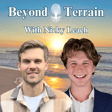

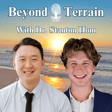
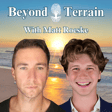
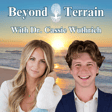
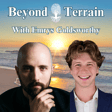
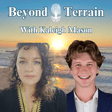
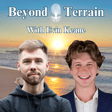
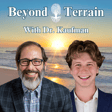


![DNA Doesn't Exist & Genomic Nonsense with Dr. Jerneja Tomsic [Part 2] image](https://media.zencastr.com/cdn-cgi/image/width=112,quality=85/image-files/652933f3a749dc383eb375de/ce5a5fd9-98c9-44fe-9b4b-3d0cd5abcf29.png)


